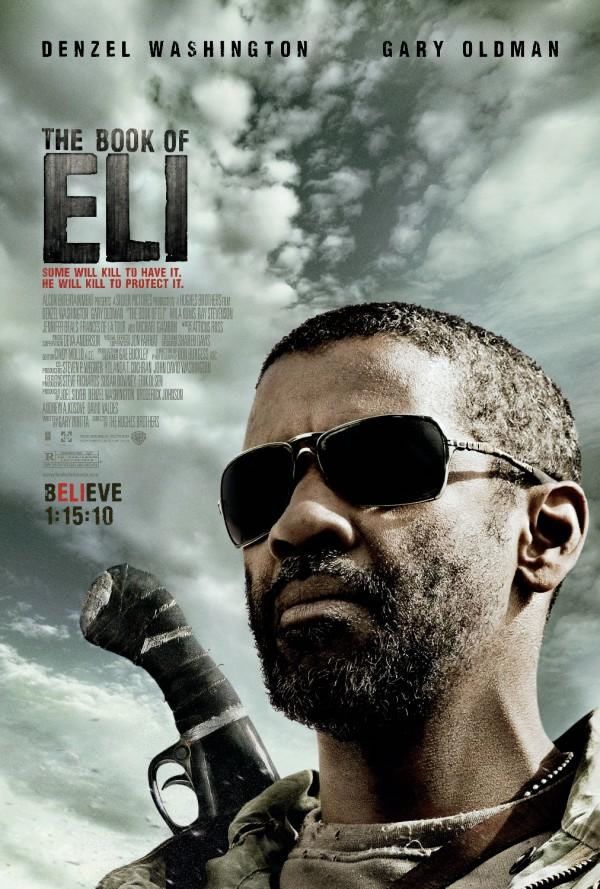Six months ago or so, Collider enjoyed the rare opportunity to visit the set of The Book of Eli, Allen and Albert Hughes' postapocalyptic thriller about a laconic hero (Denzel Washington) who battles a shrewd but ruthless mercenary (Gary Oldman) and picks up a plucky barkeep (played by Mila Kunis) while walking across country to deliver a mysterious book. The day we were on set, however, there wasn't a lot of book-bringing; rather, a massive firefight erupted outside a rickety, dilapidated house as we huddled inside a wind-whipped tent, futilely attempting to shield ourselves from billowing, violent clouds of dust. In fact, the weather was so unhospitable that Eli himself, Denzel Washington, couldn't get over to us to sit down (or even huddle) for a quick chat.
A few weeks later, the small group of attending journalists caught up with Washington via telephone, where he offered a few explanations about what we saw (and mostly couldn't see), and revealed a few details about who Eli is, why he's doing what he's doing, and how it felt to work with heavyweights like Gary Oldman. Hit the jump for more:
The thing that stood out most when we were on set was the fact that there is so much action going on in the film. Is this some of the most challenging physical action you've been a part of?
Denzel Washington: No. I did a boxing moving called The Hurricane, so that was equally [tough,] although I only boxed one guy at a time. There's one scene in here where I fight about six guys and another where I fight I think 15 guys and we shoot it all in one shot. But you know, we were fortunate - I'm fortunate number one to work with some of the top not only stunt fight guys [like Jeff Amata], but also who has trained under one of the true masters in martial arts, Danny Inosanto. Danny Inosanto and Bruce Lee came up together and [Jeff] was a discipline of Danny Inosanto so we started working a good, I don't know, five or six months ago. [But] I box; I've been boxing for 15 years so I was able to bring my boxing skills to the martial arts, swordplay skills so it was intense, but it was a lot of fun. I enjoyed it.
From what we know of the story and from what we saw is that your character is kind of a loner - almost something out of the Sergio Leone-Clint Eastwood Westerns from back in the day. Did you use those characters or films as kind of as a reference point in getting to Eli's head?
Washington: Not actively. I mean, maybe the writers did. I don't know. I didn't like watch a bunch of Sergio Leone movies or anything like that, but you know, he is a loner and there is sort of a [feeling that] the classic Western meets, I don't know, a karate movie or sword movie. Yeah, there is that aspect of it, but I didn't actually research those. I mean, the fact of the matter is the guy is by himself. I think that in a way his journey - personal journey, spiritual journey - is to learn to deal with people again. He's been given this charge, a job to protect his book, but it's almost like his final test is that he's got to deal with people.
When you go into something like this that does have such a sort of conceptual complexity, is the character already pretty well defined for you? Do you find that you have or you want to do a lot of work to sort of develop him to make him your own?
Washington: Well, I was in on the process early; I'm also a producer, you know. Alan and Albert and I went through a good, I don't know, three, four, five, six months where we worked on the material and I would sort of play all the parts and read them out loud and we were just tweaking the material and tweaking the script. I must say the first trip I finally took to New Mexico because, you know, it [was] interesting how the two of them work together. Albert's sort of like the, you know, I don't know if you call him the geek but he's the visual guy. He knows all - everything there is about every kind of camera, like we used these digital cameras as new technology, Red cameras, and I was really impressed with their preparation and the way they storyboard and what the effects are going to be. It's not a world I know as much about. I mean, I've learned a lot about it, but they've really been on the case and everything looks great and looks different, which I like, so it's been a good trip.
When we were talking on set to Gary Oldman about his character, Carnegie, he spoke a lot about how and why he decided to work with you and that you both get to explore this very intense relationship through the film. When you kind of walk in with your character, do you like to play things more spontaneously or is rehearsal between the two of you very important?
Washington: We didn't rehearse a lot. You know, he and I got together a couple of times for lunch before we started working, and then we just, I mean, [Gary] is obviously a great actor. And he knows what he's doing and he's real meticulous and he gets into [everything]; he's very specific with clothes and looks and accents and all that stuff. So he and I talked a bit. You know, there's something to be said for us not wanting to get too close because we're too strangers who come together in the story, and we didn't work out a whole lot in advance.
We did have the opportunities to rehearse the scenes a pretty good amount before we shot them, but you know, it's sort of an adversarial relationship between the characters. So I think we knew that and in some ways it was best not to. I mean, we talked but we didn't want to beat up the material too much and just get in and see what happens, because I like to do that. I like to improvise and they throw things at me, [we] respond, go back and forth.
This is the latest in a line of post-apocalyptic movies focusing on a lone hero and they come at various times in history. What do you think this movie has to say to people at this time to American audiences? Why this movie now?
Washington: Well, you know, I guess it's maybe it's a classic format. You know, what was really interesting. My son is associate producer on the film and he really was the one who stayed on me about the story and what he really was attracted to was the spiritual aspect of it and he just felt that it was important. He convinced me to do another film called Training Day so I kind of listened to him and he really, really got involved with the writers and with the directors on this and follows the dailies and is going to be involved in the post-production process. I think the difference is - you know, I mean maybe it's not different, but there's the classic battle of good and evil in this. God and the Devil if you will, and I found that interesting.
When we went to the set the other day and we saw the scene where you're in that house and hell breaks loose. It seemed pretty spectacular but it was also an incredibly windy day. How has it been shooting in New Mexico where the elements are sort of unpredictable, and what are your memories of shooting that specific scene?
Washington: Well, I definitely know what a tumbleweed is now and I know what a windstorm is. [But] it was the right place I think for this film and the people there have been very nice to us and, you know, they have a large crew now out of New Mexico. The governor of New Mexico came by the other day so I said hey, why don't we all take a picture with the New Mexico crew, and I didn't realize that people were coming out of the woodwork. It was probably two-thirds of the people there are from New Mexico so it's been a wonderful experience. It's been somewhat tough with the weather and the wind and the sand and all of that but you know, that's all a part of it. I think it helped, it helped my character.
And can you talk specifically about that scene?
Washington: You know, it was fun, man, especially with [George] and [Martha's] characters, just to watch this, you know, I won't call her old lady, but she's older than me - this mature woman firing this AK-47. I think [Mila Kunis] said something about well, what are we going to do? And she's like, I know what the eff I'm going to do, and she starts cranking the gun and it was bizarre, you know, these two old folks that eat people and have tea [also] have this small army. When reading the screenplay, it was one of the highlights. It was like what is this? And in the whole time, I think he's chosen - I forgot which song but he went with - [but] we did the math in the script and it was like an old forties tune and we said wait a minute, wait a minute. It can't be a forties tune. If they're 70 and this happened 30 years ago, you know, or 40 years ago when they got married, it was disco, you know? So I think they went to "I Will Survive" or they're going to use a disco-era tune that plays on the jukebox the whole scene. It was really well-conceived by Allen and Albert, and Albert really knows what he wants; he's really the shotmaker kind of guy, and Allen is more the actor-director-communicator kind of guy. I've never worked with two brothers before but you know, they seem to know how to work well together and get twice as much done.
I wanted to ask you a little bit more about Eli's past. Considering that the apocalypse basically happened when he was in his teens, what exactly has he been up to in that time, and how long has he been in possession of the book?
Washington: You know, there was a kid during the research that I ran across online by the name of Ben Underwood. I don't know if you've heard about this kid, and in fact he just passed away, [but] he had no eyes but he developed this sort of sonic, you know, clicking sound and he's phenomenal. If you go online, YouTube [Ben] and there's some great specials about him and what he's able to do. He skateboards, he plays basketball. He does everything, or he did, as he's passed away now. So I used his birthday as my [way of] figuring out my character, and so I was 17 working in like a Wal-Mart or a Kmart or something like that, and as the story goes, everybody had to stay inside the first year after the war, and he got out and wandered and survived. In fact we just shot the scene. I won't give you the whole scenario but he basically survived and heard a voice that led him to the book and told him where to go and why and he'll be protected. And as he says, for 30 winters he's been walking. So when exactly he got it, you know, in July? (laughs) I don't know. Probably if it was 30 years, I would say he got it after about the first two or three years.
Do you listen to any particular music to prepare for a role and if so, did you listen to any in particular for the role of Eli?
Washington: You know, Allen seems to be more of the sound guy, and Albert's more the visual guy, so Allen had put together some sounds, like some Nine Inch Nails kind of stuff. My son who was also involved in the film as an associate producer, he came up with some music. He was sending stuff back and forth and in fact, convinced Alan and I to use [a song] by Incubus. I think Allen likes the idea of more like sounds than just music and you know, I guess he'll be building that as he goes along, but he did give me a CD of different sounds and you know, somewhere between like I said Incubus and Nine Inch Nails and some other folks. I don't know how much of a "traditional" score he's going to do.
You mentioned before your son was sort of into the spiritual aspects of the story. What part of that do you think will reach a general audience, and do you think that the story plays as almost an allegory because of that?
Washington: I think that we all at some point are in search of something - a higher power, whatever you want to call it, the meaning of life. I know I was, especially at even my son's age in my 20s, and dabbling in Eastern philosophies and yoga and Buddhism and Christianity and Islam. I kind of touched them all, you know, just trying to figure out the meaning of life or if nothing else, figure myself out. So I think there's that - there is a thirst for that but, you know, as a classic battle between God and the Devil or even more specifically for the character of Eli, I mean, he's five days' walk from the promised land, if you will, for taking this book where it belongs, and literally all hell breaks loose. So I think that's sort of a metaphor for life, how when good things happen, you can be tested. It's like there's a saying there's no testimony without a test, and we're all tested in some way, so I liked the idea of the spiritual journey that this young man takes or old man takes.
Denzel, earlier in your career you were really instrumental in helping kind of normalize multi-ethnic stories, I think, with films like Mo' Better Blues.
Washington: Well, thank you. I take full credit for all of that.
My question is, is the ethnicity of your character relevant? And in a larger sense, is the ethnicity of yourself and the Hughes brothers, is it relevant and/or should it be relevant to any sort of execution of this story?
Washington: You know, it's interesting. I have four children and the youngest just turned 18 on Friday and it's an entirely different world for them than it was even for my generation, where the beginning of my young life, I remember going down South where you still couldn't drink out of water fountains and you didn't realize it. I guess my parents protected me from it when I was still young, that we went to the black beach not to the white beach, and all of that kind of stuff - a lot of that stuff we as parents have to be careful to not lay that on our kids. You know what I mean? Things have changed a lot, I mean obviously, look at the President. Things have changed a lot and you know, I mean obviously it's not a perfect world we live in. There's still some of us older geezers running around that still hold onto some of those old prejudices or at least have been affected by them, but I'm trying to be more careful as to how I speak with my kids. Just because it's a different world, and I think that world and younger people were sort of the driving force behind even the Barack Obama presidency. I mean, wasn't it the guy from Facebook that ran part of his campaign? He's like 24 years old. They're seeing things different. Times are changing. Are we there a hundred percent? No, obviously not, but it's a different world. You know, it was a dream for Martin Luther King 40 some odd years ago, his famous speech, but it's a reality for a lot of these young kids now.
Because it's so stylized with that kind of quasi-Western with post-apocalyptic feel, how did you kind of want to dress Eli and show him to the audience so that either it sets a tone or it reflects what you need it to reflect?
Washington: Well, he travels light, so we went to some survival stores and different things, and he picks up things here and there - not that it means anything. I never wore underwear. He didn't have any because he wore them out. So it wasn't as difficult, but we did some little cute things like the sneakers. He starts off in sneakers that are all taped-up and beat-up that are actually the latest Lebron James sneakers, but he's a survivalist and he had to travel light. I don't think he had a second set of clothes. I can only squeeze so much in that backpack.
Was there anything that you added to kind of help define him visually or to kind of set the mood and tone of the character or movie?
Washington: Well, I was going to go with a bald head kind of clean look, and I was growing this hair and we looked at it, and because he and [Carnegie] and [Martha] and [George] are considered some of the oldest people left, I thought it was important to have all the gray. You know, I can't really grow a good beard but I had it all filled-in and look gray and, you know, but yet he's physically fit and he's a survivor.


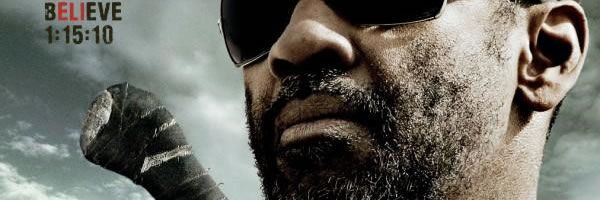
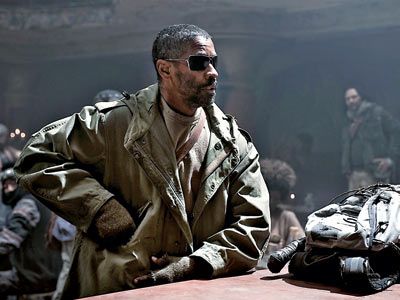
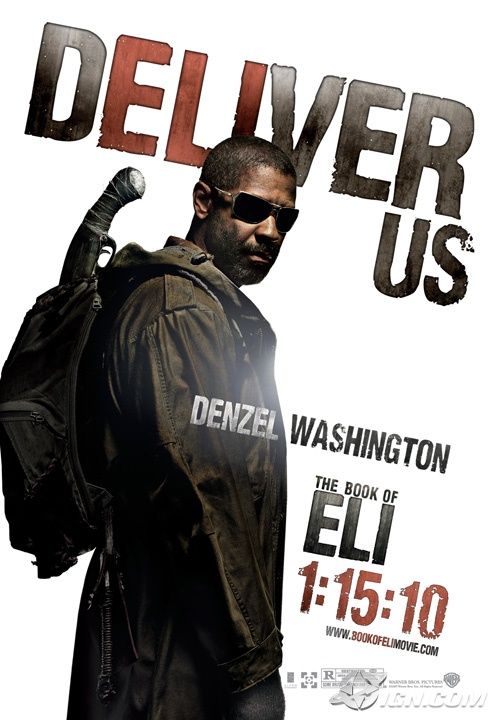
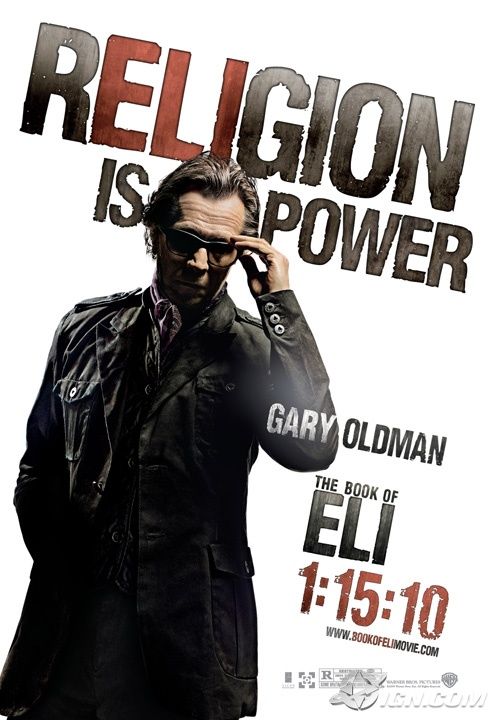
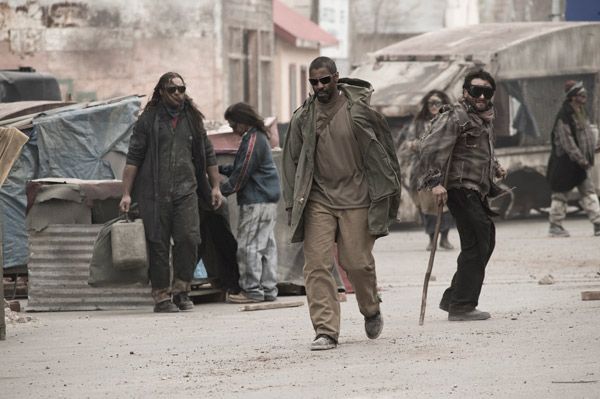
a.jpg)
.jpg)
.jpg)
